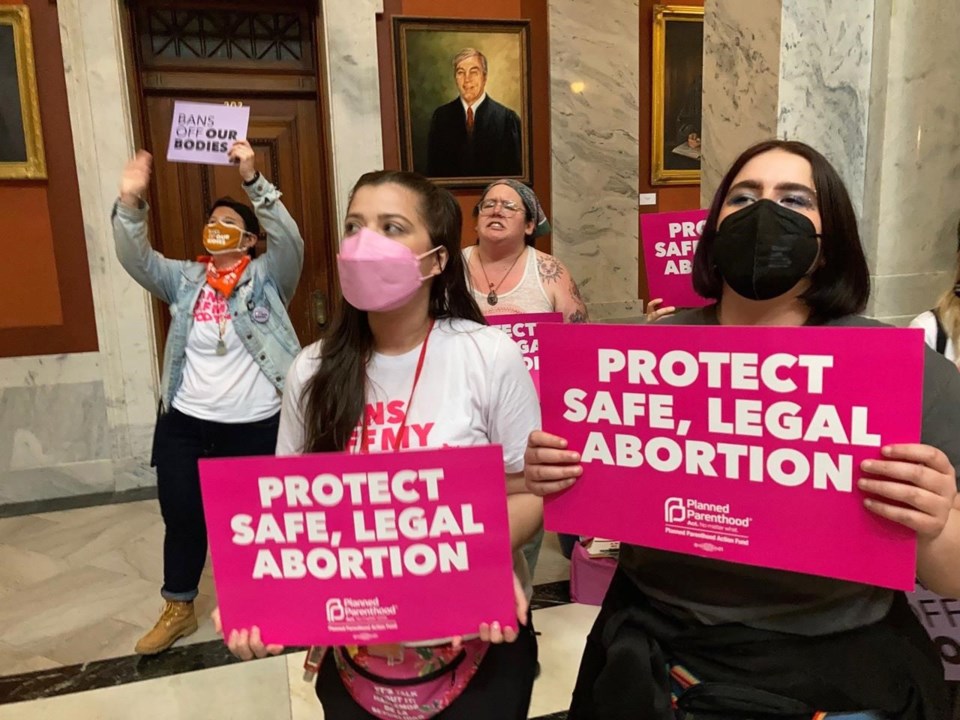LOUISVILLE, Ky. (AP) — Abortion-rights groups filed a court motion Tuesday to dismiss their lawsuit challenging Kentucky's near-total abortion ban but signaled that the legal fight is far from over.
The groups' strategy will focus on the next legal challenge expected to come from pregnant women who were denied abortion services in Kentucky.
“We will be back in court when we have a patient plaintiff,” Tamarra Wieder, Kentucky state director for Planned Parenthood Alliance Advocates, said in a statement.
The current suit was filed by attorneys for the only two abortion clinics left in Kentucky when the state's ban on the procedure took effect following the 2022 U.S. Supreme Court’s ruling overturning Roe v. Wade.
The plaintiffs in the Kentucky suit failed to get abortion access restored in a February ruling by Kentucky's Supreme Court that focused on narrow legal issues. The justices didn't resolve larger constitutional questions about whether access to abortion should be legal in the Bluegrass State.
Abortion providers challenged the ban on the premise that it violated patients’ constitutional rights, but the state's high court ruled that the providers lacked the “third-party standing” to do so. The justices sent the case back to a circuit court in Louisville.
Last year, Kentucky voters rejected a ballot measure that would have denied any constitutional protections for abortion, handing a victory to abortion-rights supporters.
The outcome highlighted what appeared to be a gap between voter sentiment and the expectations of Kentucky’s GOP-dominated Legislature.
The legal challenge brought by the Louisville abortion providers revolves around Kentucky’s near-total trigger law ban and a separate six-week ban — both passed by the state's Legislature. The trigger law was passed in 2019 and took effect when Roe v. Wade was overturned. It bans abortions except when they’re carried out to save the life of the patient or to prevent disabling injury. It does not include exceptions for cases of rape or incest.
Republican state Attorney General Daniel Cameron's office has defended the bans. Cameron said Tuesday that his office will steadfastly defend the state's anti-abortion laws.
“We are gratified that the abortion providers recognized their case should be dismissed,” Cameron said in a statement. “As a result of our efforts, I am proud to say that the elective abortion industry is out of business in Kentucky.”
Addia Wuchner, executive director of Kentucky Right to Life, hailed the development as a victory for anti-abortion groups, who strive to make the procedure “unthinkable.”
Since the state's near-complete abortion ban took effect, abortion-rights groups say they have helped Kentuckians “get the care they need, including helping patients find care out of state.”
The groups opposing the ban, including the American Civil Liberties Union of Kentucky and Planned Parenthood, said Tuesday that the motion to dismiss the suit stemmed from the state Supreme Court's ruling “that took away health care providers’ ability to defend the rights of their patients.”
“Bringing cases on behalf of patients has been standard practice in Kentucky and across the country for good reason — numerous obstacles stand in the way of patients coming forward to participate in litigation,” the groups said in a statement.
The question before the Kentucky justices in their February ruling was whether there was a reason to reinstate a lower court’s injunction and block the bans from being enforced.
“To be clear, this opinion does not in any way determine whether the Kentucky Constitution protects or does not protect the right to receive an abortion, as no appropriate party to raise that issue is before us,” Deputy Chief Justice Debra Hembree Lambert wrote. “Nothing in this opinion shall be construed to prevent an appropriate party from filing suit at a later date.”
Now abortion-rights advocates say they'll team up with people who are pregnant and interested in challenging the abortion bans — in an effort to help restore access to the procedure in Kentucky.
“This fight is far from over," Wieder said.
Bruce Schreiner, The Associated Press



